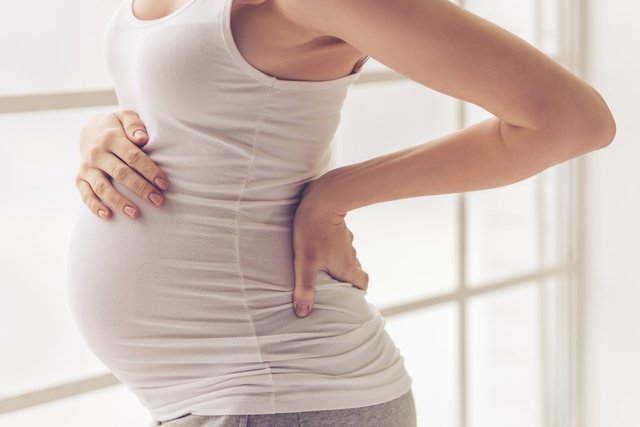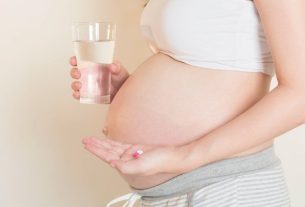Discomforts during pregnancy, such as morning sickness, heartburn, headache, hemorrhoids, back pain, shortness of breath, constipation or swelling in the feet, are very common during pregnancy and may arise due to the normal hormonal changes during pregnancy and the increase the weight of the uterus.
These discomforts can be alleviated with simple measures, such as eating at short intervals, avoiding lying down after a meal, keeping the body hydrated and doing exercises recommended by your doctor.
Discomforts during pregnancy should always be communicated to the obstetrician during prenatal consultations. However, if they are accompanied by other symptoms, such as chest pain, rapid breathing or numbness, for example, you should go to the emergency room immediately.

17 main discomforts during pregnancy
The main discomforts during pregnancy are:
1. Morning sickness
Morning sickness is common at the beginning of pregnancy and can begin around the 2nd to 4th week, caused by normal hormonal changes during pregnancy, which increase stomach acidity and tend to disappear around the 3rd or 4th month of pregnancy.
To alleviate morning sickness, you can eat in short intervals every 2 or 3 hours and in small quantities or use natural remedies such as ginger tea, which can help alleviate discomfort. See natural options to alleviate morning sickness.
Don’t ignore the signs your body is giving you!
2. Insomnia
Insomnia can arise due to hormonal changes in a woman’s body, being more common at the end of pregnancy due to the size of the belly, which can make it difficult to find a comfortable sleeping position, causing tiredness and drowsiness during the day.
To alleviate this discomfort, you can sleep with a pillow between your legs and lying on your side or in a position that is comfortable, to help reduce the discomfort that makes sleeping difficult. Find out how to alleviate pregnancy insomnia.
Read too: Sleep during pregnancy: is it normal? when it appears (causes and what to do)
3. Increased appetite
Increased appetite during pregnancy and desire for specific foods can appear in any trimester of pregnancy.
This occurs because the symptoms of morning sickness, heartburn or a burning sensation in the stomach are less intense or due to nutritional deficiencies in the pregnant woman. Understand why cravings arise during pregnancy and what to do.
4. Dizziness
Dizziness is a common symptom in early pregnancy due to normal hormonal changes and increased blood flow in a woman’s body, which can cause low blood pressure.
However, dizziness during pregnancy can also arise due to dehydration, hypoglycemia or anemia, for example. See other causes of dizziness during pregnancy.
5. Headache
Headache during pregnancy is a common symptom during the 1st trimester of pregnancy, caused by normal hormonal changes during pregnancy, tiredness, nasal congestion, or hunger, and can be relieved with rest, hydration or light nutrition.
In the second or third trimesters, headaches can be caused by high blood pressure, gestational diabetes or even excessive weight gain. Check out the main causes of headaches during pregnancy.
When a headache appears in the 2nd or 3rd trimester, starts suddenly and is accompanied by other symptoms, such as stomach or abdominal pain, nausea, blurred or blurred vision, you should go to the hospital immediately as this may be indicative. of pre-eclampsia or eclampsia. Know how to identify the symptoms of eclampsia and pre-eclampsia.
6. Increased sensitivity in the breasts
Pain and increased sensitivity in the breasts can begin to be felt by pregnant women from the 1st trimester of pregnancy due to hormonal changes that cause the pregnant woman’s breasts to increase in size and become firmer and more sensitive, which can cause pain or discomfort. .
To alleviate this discomfort, it is recommended to wear a support bra to alleviate sensitivity, pain or the feeling of heavy breasts. This bra can also be used at night to support the breasts and alleviate discomfort.
7. Constipation
Constipation during pregnancy can arise due to hormonal changes and pressure from the uterus that cause digestion to slow down, which can last until the end of pregnancy.
Constipation during pregnancy can be relieved by drinking around 2 liters of water per day, doing regular exercise, such as walking or water aerobics, and increasing the consumption of foods rich in fiber, in the form of whole grains, fresh fruits and vegetables. See other ways to relieve constipation during pregnancy.
8. Excess gas
Excess gas during pregnancy is also related to hormonal changes, slowing intestinal transit, facilitating the production of gas, which can last until the end of pregnancy.
To alleviate this discomfort, it is recommended to avoid foods that stimulate the production of gases such as beans, cabbage, broccoli or cauliflower, for example, in addition to keeping the body hydrated, and consuming foods rich in fiber such as fresh fruit and whole grain bread or cereals. . Check out other tips on how to relieve excess gas during pregnancy.
9. Hemorrhoids
Hemorrhoids during pregnancy can arise due to the dilation of blood vessels in the anal region, compression of these vessels by the weight of the uterus and also due to hormonal changes during pregnancy that can slow down the intestines, causing constipation that leads to greater effort to defecate and the dilation of blood vessels.
Hemorrhoids during pregnancy can be relieved by taking a sitz bath with warm water, in addition to avoiding sitting or standing for a long time.
Furthermore, it is also important to increase your water intake and avoid exerting excessive force when having a bowel movement, for example. See other ways to relieve hemorrhoids at the end of pregnancy.
10. Frequent urge to urinate
During pregnancy, a woman may feel the need to urinate more often during the day or need to get up at night to go to the bathroom, and this occurs due to the greater blood flow to the pelvic region, caused by the beta-HCG hormone.
Additionally, the growing uterus can put pressure on the bladder, and the kidneys become more efficient at getting rid of toxins in the body, increasing urine volume and causing the urge to urinate more frequently.
In this case, it is important not to reduce the amount of fluid intake, as keeping the body hydrated is essential for the healthy development of the baby.
Furthermore, it is important not to hold urine and try to completely empty your bladder, as leaving urine trapped in the bladder can increase the risk of urinary infection. Know how to identify the symptoms of urinary tract infections during pregnancy.
11. Asia
Heartburn is a common symptom in any trimester of pregnancy and occurs due to normal hormonal changes that lead to greater production of acid by the stomach, greater relaxation of the muscles of the stomach and esophagus and also due to compression of the stomach by the uterus.
To alleviate this discomfort, it is important not to lie down right after meals, to eat in small quantities and at intervals of less than 2 to 3 hours and to place the head of the bed higher. See other ways to relieve heartburn during pregnancy.
12. Back pain
Back pain can appear at the beginning of pregnancy, but is more common at the end of pregnancy.
This occurs due to the growth of the uterus which causes a change in the shape of the body and center of gravity, causing the lower back to be pulled forward while the abdomen is projected outwards. See other causes of back pain during pregnancy and how to alleviate it.
13. Colic
Colic during pregnancy is normal, especially at the beginning of pregnancy, due to the implantation of the embryo and the adaptation of the woman’s body to the baby’s growth, and can be relieved with rest and relaxation.
However, it can also appear in the 2nd or 3rd trimester of pregnancy, due to training contractions, called Braxton-Hicks, in which case it is recommended to move the body or do physical exercises recommended by the doctor. See other causes of colic during pregnancy.
However, if cramps occur after 37 weeks of pregnancy, have progressive intensity and become more constant over time, and do not improve when changing position, they may be indicative of labor. Know how to identify the symptoms of labor.
14. Shortness of breath
Shortness of breath is more common in the 3rd trimester of pregnancy and occurs due to the enlargement of the uterus, which can cause compression in the lungs that are unable to expand as they were before pregnancy, making breathing difficult. See other causes of shortness of breath during pregnancy.
To alleviate this discomfort, you should sit down, put your legs up and relax, breathing deeply, avoiding excessive effort and stressful situations. Additionally, meditation and breathing exercises can help reduce this discomfort.
However, if you experience intense shortness of breath, difficulty breathing, rapid or wheezing, chest pain, bluish lips or fingers, or numbness in your hands or feet, you should seek medical help as soon as possible or the emergency room at the earliest. next.
15. Pelvic pain
Pelvic pain during pregnancy occurs because the round ligament, responsible for attaching the uterus to the abdominal muscles, stretches to support the weight of the baby and the size of the growing uterus. Check out other causes of pelvic pain during pregnancy.
To alleviate this discomfort, it is recommended to do stretches that work the hips and pelvis. These exercises include various yoga positions, which in addition to relieving pain, provide relaxation.
16. Cramps
Cramps during pregnancy may arise due to the normal hormonal changes during pregnancy and the decrease in blood circulation in the legs due to the compression of the vessels and arteries of the pelvis by the weight of the uterus.
However, they can also arise due to weight gain, circulation problems, dehydration or nutritional deficiencies. See other causes of cramps during pregnancy.
When you feel the cramp, you should massage or gently stretch the calf, making movements with your feet, pulling the heel down and the toes up, or apply hot compresses to the area with the cramp, such as the feet, ankles or legs. .
17. Swelling in the feet
Foot swelling occurs mainly at the end of pregnancy due to the greater volume of blood circulating in the body, which increases fluid retention.
Furthermore, it also occurs due to the weight of the uterus, which can compress the veins and arteries in the pelvic region, making circulation and the return of blood from the feet and legs to the heart difficult.
To relieve swelling in the feet, you should place your feet higher than your body, with the help of a bench or cushions, when sitting or lying down, do not wear tight shoes, do not stand for a long time and practice regular physical exercise, such as walking or swimming, as directed by your doctor. See other ways to get rid of swelling in your feet during pregnancy.
When to go to the doctor
It is important to consult your obstetrician if discomfort during pregnancy is accompanied by other symptoms, such as:
- Severe or sudden headache;
- Pain in the stomach or abdomen;
- Blurred or blurred vision;
- Bloating and rapid weight gain;
- Nausea or vomiting;
- Loss of appetite or weight loss;
- Fever;
- Vaginal bleeding;
- Decrease in the amount of urine and the urge to urinate;
- Fainting;
- Seizures.
These symptoms must be evaluated by a doctor as they may indicate health problems that require immediate treatment, in order to avoid complications for the woman and the baby.

Sign up for our newsletter and stay up to date with exclusive news
that can transform your routine!
Warning: Undefined array key "title" in /home/storelat/public_html/wp-content/plugins/link-whisper-premium/templates/frontend/related-posts.php on line 12
Warning: Undefined array key "title_tag" in /home/storelat/public_html/wp-content/plugins/link-whisper-premium/templates/frontend/related-posts.php on line 13



